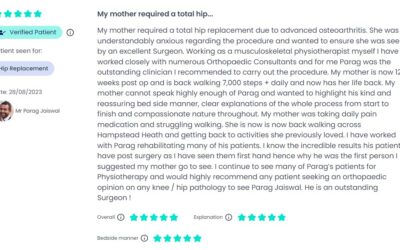As a Hip and Knee Consultant, I often get asked, “How long will my hip implant last?” It’s a vital question for anyone considering or who has undergone hip replacement surgery.
Hip replacement surgery, where a damaged hip joint is replaced with an artificial one, is a highly successful procedure that can greatly improve quality of life. However, like any artificial device, a hip implant has a lifespan.
Typically, hip implants can last between 15 to 20 years, sometimes longer, depending on various factors. These include the type of implant, the material it’s made from, your activity level, and your overall health. Advances in medical technology have continually improved the durability of these implants.
A critical factor in the longevity of a hip implant is how it’s used. High-impact activities, excessive weight, and certain movements can accelerate wear and tear. Conversely, regular, moderate exercise and maintaining a healthy weight can help prolong the life of your implant.
It’s also important to have regular check-ups with your surgeon. These appointments allow us to monitor the condition of your implant and address any issues before they become significant problems.
If you notice any changes in your hip, such as pain or reduced mobility, it’s essential to consult your doctor. These could be signs that your implant is wearing out or that there are other issues that need to be addressed. I am about to revise a 94 year-old lady’s hip replacement because her plastic is completely worn out and there is now metal damage. She had hip pain for over 5 years, but did not seek orthopaedic advice and now has metal debris in her joint.
In conclusion, while hip implants don’t last forever, they can provide many years of improved mobility and pain relief. As technology advances, so does the longevity of these implants. Remember, taking care of your overall health and following your surgeon’s advice are key to maximising the lifespan of your hip implant. If you start feel persistent pain after having had a hip replacement (regardless of how long ago it may have been), it is important to see expert advice.
If you’re considering hip replacement surgery or have questions about your hip implant, don’t hesitate to reach out. Visit my contact section here for a consultation and personalised advice.




